So you want to work for an NGO...?
Thinking of working for a humanitarian organisation like MSF? Project coordinator Veronika Cernikova shares her tips...
I wrote this post as friendly advice. I want to give fair warning to everyone who is thinking of joining (or has already joined) a humanitarian non-governmental organisation (NGO)!
My assignment
I recently arrived at my first assignment with MSF in Sudan's West Darfur State.
MSF is working in a small health centre in a camp for internally displaced people in Krinding locality near Geneina, the capital of the state. Our goal is to provide quality primary health care free of charge to the most vulnerable population in West Darfur.
MSF has been running the primary health care project in collaboration with the Ministry of Health (MoH) and our presence here is coming to an end, so we are preparing to hand over the project to the ministry.
My role
I'm a project coordinator (sometimes known as a "field coordinator" or "field-co"). This means that most of my work is done either at a desk, or running around and "coordinating".
Sometimes I just stand somewhere in the corner and watch the nurses and doctors work in the observation unit. It is amazing how much they can do with limited resources and in tough conditions.
My advice
Anyway, back to the topic. Most humanitarian workers are from the countries where they are working, whilst a small percentage are international staff like me, who travel from abroad. But host country staff can also be working far from their home towns, in new environments.
Around the time I arrived, I started to write a short list of tips for future generation of MSF field workers. Soon, a few bullet points turned into a long shopping list. Here you go...
Do NOT work in the humanitarian sector unless:
- You are ready "to be ready" 24/7
- You are ready to listen stories about defecation, bowel movements, childbirth from tukuls (traditional mud-houses with a thatched roof), the craziest broken arms or legs you’ve seen on assignment (I know it might sound interesting, but I don’t like hearing about open fractures while I am eating my rice)
- If you're a vegetarian, you are ready to explain every day to a cook, a waiter in a restaurant or anyone around that you really do not eat meat and that chicken is, in actual fact, also meat
- You are ready to drink hectolitres of tea with different people (because you simply don’t turn down an offer for good sweet tea)
- You are ready to improvise – there is nothing that can’t be fixed with duct tape
- You are ready to fight for your Bounty chocolate bar, even with the most senior member of the team!
- If you're working away from home, you are ready to wait in line for the bathroom every morning along with your workmates, and to take a shower (or use the bathroom) while wearing a headlamp
- Another one for people working in new environments: you are ready, at least once a month during your posting, to spend all night and day (or longer) in the bathroom (there is just no way to avoid stomach flu in a new place)
- And for international staff – you are ready for everyone to instantly forget your name and for the rest of your posting, you will be called khewaja (foreigner) or just receive a "local name" – so in a couple weeks you just answer "yeah" to any name (Veronika, Feiruz, Fatima, Venicia, V...???, Alain, Hannan…)
- You are just ready!
I love my work
And now that I think about it…. I LOVE MY WORK! I love waking up every morning here and knowing that there are many challenges waiting for me, many emails, many meetings with the authorities, partners, and other organisations, etc.
I like seeing the progress that we have made: improvement in services, people getting medical treatment, renovated premises, and I like simply talking to people about their everyday lives. Not everything in the humanitarian sector is only about saving lives. Sometimes it is also about being there and listening to people’s stories.
Hard work
As a project coordinator, I am often the first one in the office and the last one to leave. But, at the end of the day, when you see the team coming from the different parts of the project with all the updates (true, the updates are not always happy news), you see the hard work behind you, you know that you are part of this and that you have contributed a little bit to making it successful.
So to sum up: don’t work in the NGO sector… or rather do...

